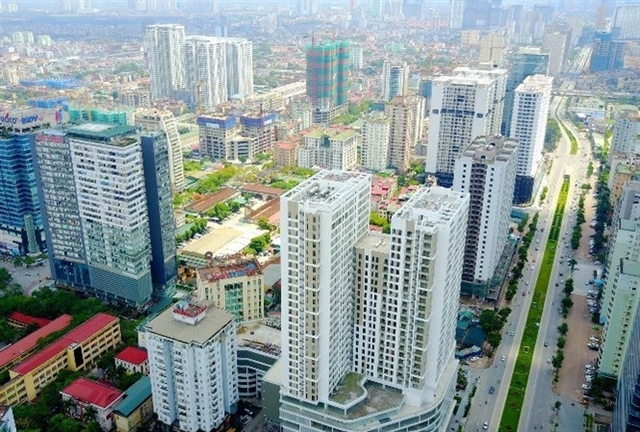The condominium market in Ha Noi last year saw a strong reduction in growth due to the COVID-19 pandemic though there were signs of recovery in the fourth quarter, said the CBRE Vietnam.

The condominium market in Ha Noi last year saw a strong reduction in growth due to the COVID-19 pandemic though there were signs of recovery in the fourth quarter, said the CBRE Vietnam.
In 2020, there were approximately 18,000 units launched in Ha Noi leading to totally new launches falling 52 per cent year-on-year. This was the lowest volume of annual new supply since 2015 when the market recovered, according to a CBRE report released on January 7.
Notably, new launch supply bounced back in Q4 after a relatively quiet first nine months of 2020 with more than 7,200 units, similar to pre-COVID-19 quarterly launch levels.
In terms of location, the new supply from the east surpassed other clusters for the first time making up 44 per cent of 2020’s total new launches. The supply from this cluster mostly came from mega townships such as Vinhomes Ocean Park and EcoPark.
There were 18,500 units sold during 2020, exceeding the new launch. Local end-users were a major source of demand as suspended international flights disrupted sales to foreign buyers.
Selling prices in the primary market in Q4 averaged US$1,412 per sq.m, up by 3 per cent year-on-year. The first high-end projects were introduced in locations such as Gia Lam and Long Bien districts in 2020, setting new pricing levels for the east.
In addition, the latest projects launched in townships across Ha Noi also sought higher pricing levels than previously launched projects in the same communities relying, on the completion of amenities and better connectivity.
In a year of disrupted activities due to local lockdowns and suspended travel, technology came into play to assist with sales and investment decision making.
“Local developers have looked into ways to embrace technology to streamline the sales process. This has come in even more relevant in the pandemic era, as the technology could help minimise disruption and risks,” said Nguyen Hoai An, director of Ha Noi Branch, CBRE Vietnam.
“In upcoming years, proptech, big data and technology will play critical parts in analysing and understanding the buyers, helping developers to capture the demand and seize new opportunities, as much as disrupting and challenging any outdated approach to market products.”
Retail, office markets
The report also said in 2020, the retail sector was one of the sectors most affected by the COVID-19 pandemic. Viet Nam’s total sales and service consumption in the 2020 only grew by 2.6 per cent, much lower than the increase of 11.8 per cent in 2019.
Retail real estate also witnessed some significant impacts during the year of the outbreak. In Ha Noi, retail space saw vacancy rates increase in both central business district (CBD) and non-CBD area. In CBD, the vacancy rate increased by 12.9 percentage points year-on-year, reaching 14.3 per cent, the highest level since 2011.
At the same time, the vacancy rate in the non-CBD area increased by 3.3 percentage points year-on-year, to 12.3 per cent. As most tenants experienced challenges during this tough time, many tenants in fashion and F&B had to close.
However, with efforts to control the pandemic throughout the year, the retail market in Viet Nam regained its momentum, through the openings of two retail projects in Q4, namely the International Centre (renovated) and Vincom Mega Mall Ocean Park, adding 41,000 sq.m to Ha Noi’s retail supply.
As a result, by the end of 2020, Ha Noi retail supply volume reached about 1 million sq.m, up 4 per cent compared to 2019. Still, the growth rate is lower than the rate of two recent years as some projects were not launched due to COVID-19.
Meanwhile, new supply in the Ha Noi office market in 2020 recorded a total of 126,000 sq.m, the highest since 2014. Total office space of both grades in Ha Noi surpassed 1.5 million sq.m, with more than a third of the total supply from Grade A projects.
Viet Nam’s economy was heavily impacted by the COVID-19 pandemic. As a result, some tenants contracted their office space during the year. Even though the market performance improved in Q4, the total net absorption of the Ha Noi office market in 2020 was down around 9,000 sq.m.
Due to the contraction trend and large supply in 2020, vacancy rates of Grade A office in Ha Noi surged to 23.2 per cent, down by 1.1 percentage points quarter-on-quarter and up by 15.7 percentage points year-on-year. — VNS





